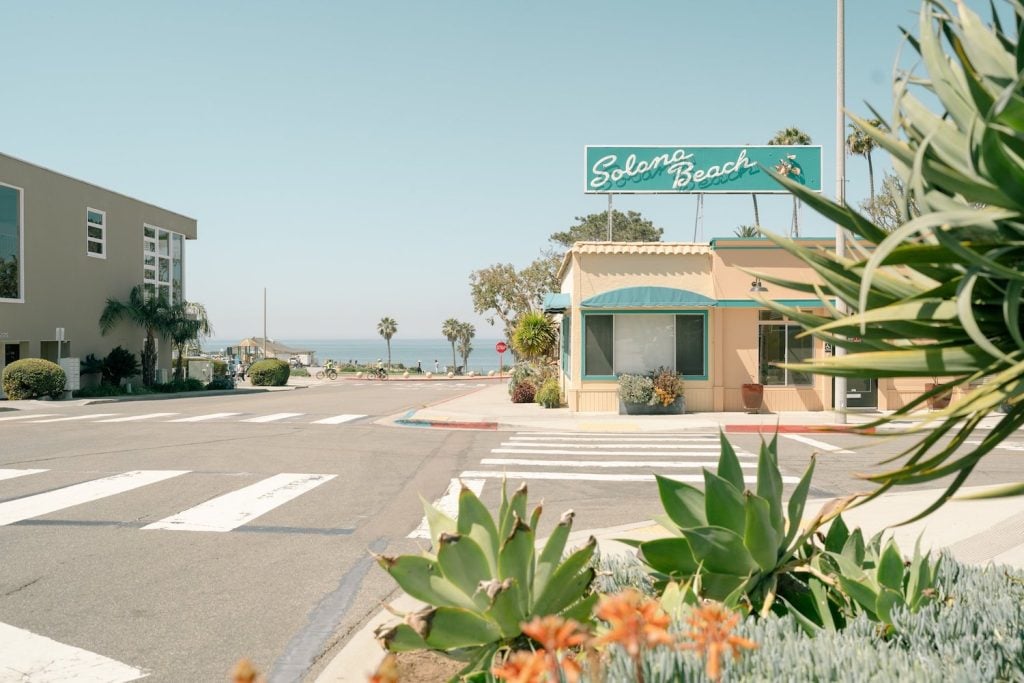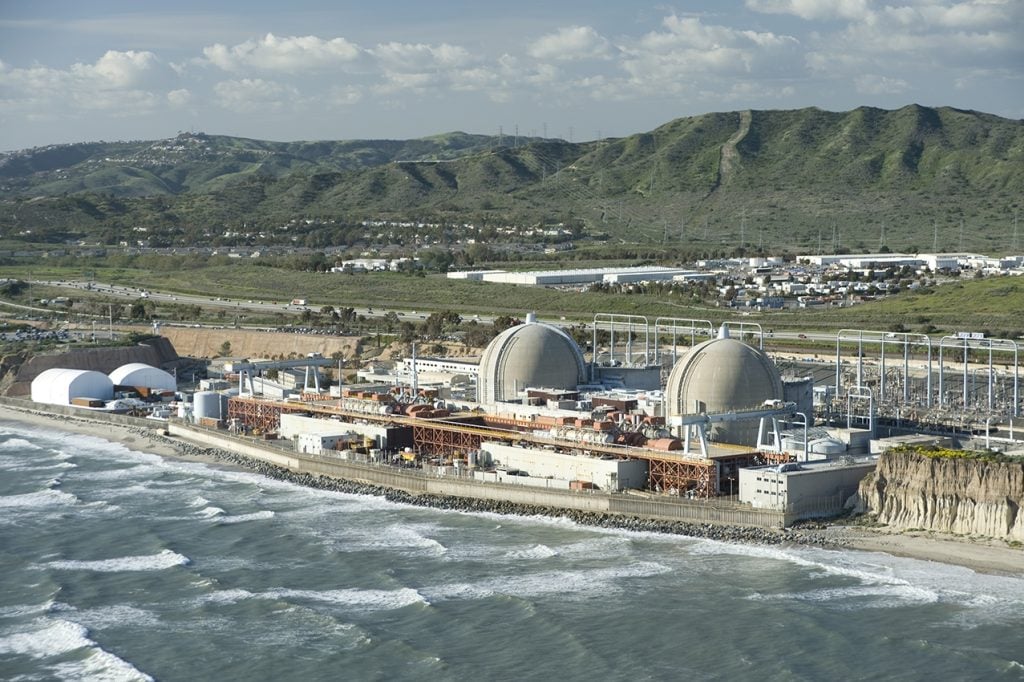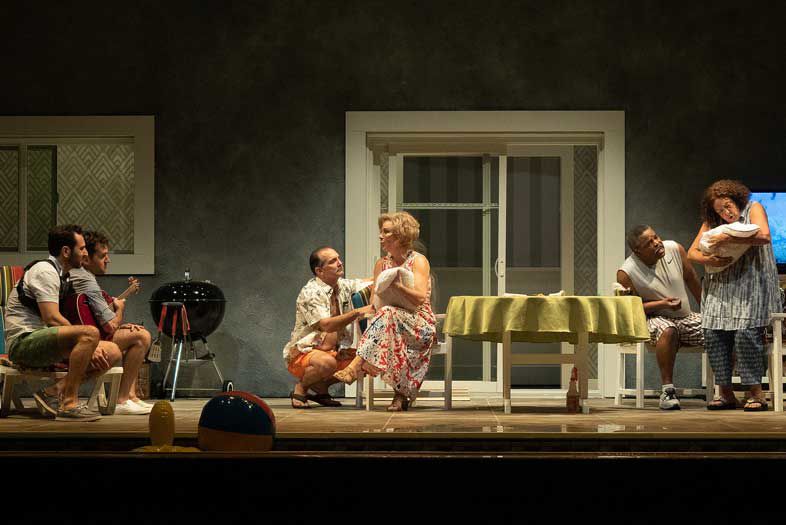High-concept narratives are risky. If your unconventional structure doesn’t tell the story better than a straightforward presentation would, it just becomes a gimmick, working parallel to but not in tandem with its content. The high concept that structures Lindsey Ferrentino’s The Year to Come succeeds, enriching its story in fascinating and surprising ways. The play begins now—December 2018—at a family New Year’s Eve celebration, and unfolds backward in time, checking in on the same family every New Year’s Eve prior, all the way back to 2000. Their holidays center around an actual three-foot-deep backyard pool that’s built into the set—an impressive achievement by scenic designer Christopher Acebo.
You can do several clever things in this format that you couldn’t in a timeline running forward, and the play tries them all, sentimental, comically ironic, mysterious. Pop Pop (Peter Van Wagner) is at first absent and fondly remembered, then present but invalid and mute, unmoving from one spot for several years, only to then spring to his feet and deliver a rousing monologue and guitar solo, anti-time miraculously curing him. Ironic jokes that are funny only in hindsight (“I can’t imagine there ever being a worse president than Bush”; “N*Sync will still be touring when they’re old and gray,” etc.) are well chosen up until the last few years, when they’re leaned on maybe a little too often. Likewise, the buried past that everyone tiptoes around is an intriguing source of mystery right up until the play’s only real misstep, which is impossible to discuss without spoilers, so I’ll get back to that in a minute with adequate warning.
Our family’s composition and major historical beats map organically to those of America at large. Pop Pop arrived through Ellis Island, a Jew fleeing Nazi Germany; his daughter Estelle (Jane Kaczmarek, best known as Lois from TV’s Malcolm in the Middle) spends years working through a trauma we learn about only gradually, and his other daughter Pam (Marcia DeBonis, seen recently as an inmate radio host on Orange Is the New Black) contends with multiple chronic health issues. Pam and her husband Joe (Ray Anthony Thomas) got a mortgage they couldn’t afford right before the 2008 recession, and are one of those curious Florida couples who voted for both Obama and Trump, evincing laid-back, fact-agnostic stances that infuriate their nephew Jim (Adam Chanler-Berat), who swears every year that he’s never coming back. Jim and his husband (née boyfriend, née “roommate”) Sinan (Pomme Koch) have an increasingly tenser relationship with Estelle’s husband, Frank (Jonathan Nichols) as time rewinds—though refreshingly little of that tension has to do with Sinan’s being Muslim and Frank’s being a conservative Long Island firefighter who responded on 9/11.
There’s clearly a wealth of narrative potential here, and for 18 of the play’s 19 years, the cast and writing harmonize to explore it beautifully, under the fine direction of UC San Diego MFA alum Anne Kauffman.
There’s clearly a wealth of narrative potential here, and for 18 of the play’s 19 years, the cast and writing harmonize to explore it beautifully, under the fine direction of UC San Diego MFA alum Anne Kauffman. Very few scenes contain any explicitly “important” conversations, instead allowing a portrait of a complicated family to emerge through incidental slice-of-life interactions that subtly change through time. No one’s a cliché, not even politically incorrect Frank, who’s got the biggest personality and earns consistent laughs. Character is revealed in fascinating, well-acted tidbits year after year, until—
Until.
Here’s the spoiler warning, if spoilers bother you. Personally, I think that knowing a twist or surprise in advance should not make good writing fall apart. Unless it’s a genre mystery and the reveal is the whole point, the path you take should remain enjoyable even if you know what it’s leading to. If knowing the ending saps a second viewing of tension and joy, it’s less of a story than a knock-knock joke. Still, I wouldn’t delve into those ending details unless they dramatically altered our perspective of the plot as a whole, as they do here.
So, with that in mind: Our final character, Abigail (Jenna Dioguardi), like Pop Pop, also starts off unseen, credited in the program only as “Performer” and mentioned only occasionally in family anecdotes or as a name that immediately prompts a change in subject. If you’re paying close attention, by 2003 or so you’ve put together that she was Jim’s sister and her absence is intimately tied up in the family’s shared pain—and if you’re me, you’re praying Please God, don’t have her die in 9/11.
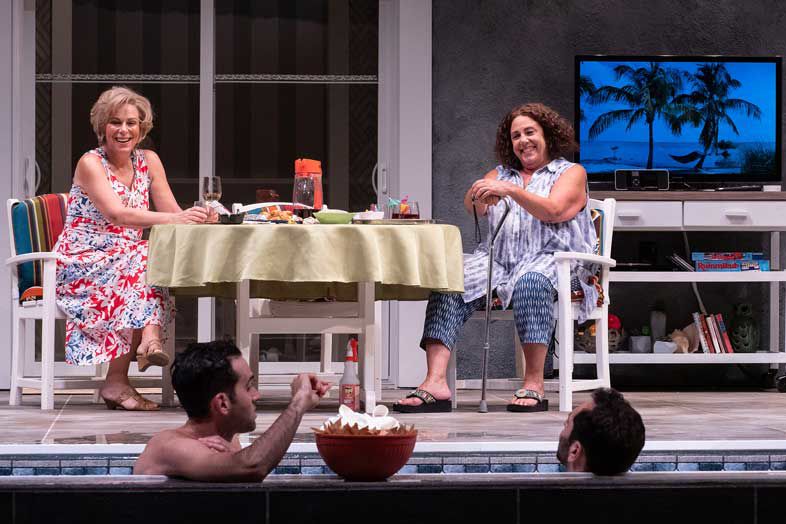
Family Politics Unfold Backward in Time in ‘The Year to Come’
Jane Kaczmarek, Adam Chanler-Berat, Pomme Koch, and Marcia DeBonis in The Year to Come | Photo: Jim Carmody.
But then she appears, for just the final year, and since everyone has unnaturally refrained from referring to her in detail before this, she exists only as a tiresome trope: the pretty young woman full of potential whose tragic murder serves as the key motivation for other characters—and just in case anyone needed the hand-holding, Frank finds a reason to refer to her office location “in the North Tower.” Turns out, nearly all the lovely, nuanced character work we’ve been exploring for two hours converges in a tidy bow on one event whose enormity is impossible to find nuance in in the span of one scene. It’s especially bewildering, given that Frank has had several great scenes earlier to work through his specific emotional reaction to 9/11 while carefully avoiding all mention of his daughter. Treating this as a reveal creates the effect of a play that for 95 percent of its runtime is about many things, including 9/11, then suddenly—ta-da!—it was Mostly About 9/11 the entire time. It feels cheap, manipulative, and insulting, as if the writer knows, but could not trust her audience to believe in, the lack of straight lines and simple explanations behind real-life family dynamics or the greater historical trends they’re meant to reflect on.
Maybe other theatergoers require and will be satisfied by that dead weight dropped in at the end to explain everything. It’s possible the writer didn’t intend for it to be the all-eclipsing “aha” moment that it is—but why else the purposeful elision, why else end immediately in 2000 rather than after an even 20 years, which might have given Abigail room to be more than a blank corpse? This world-premiere is thought-provoking and at times deeply affecting, backed at all but that one point by sharp, confident writing and a cast full of immense talent. Maybe if you head into it knowing the gigantic curve ball that’s coming, you can avoid being thrown by it and enjoy all its laudable qualities for what they are.
The Year to Come
At La Jolla Playhouse through December 30
Tickets at lajollaplayhouse.org
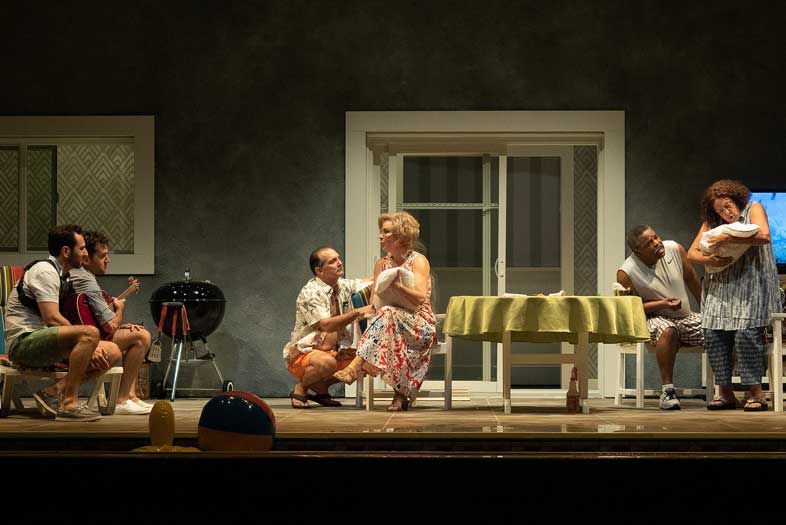
Family Politics Unfold Backward in Time in ‘The Year to Come’
The cast of La Jolla Playhouse’s world-premiere production of The Year to Come | Photo by Jim Carmody


